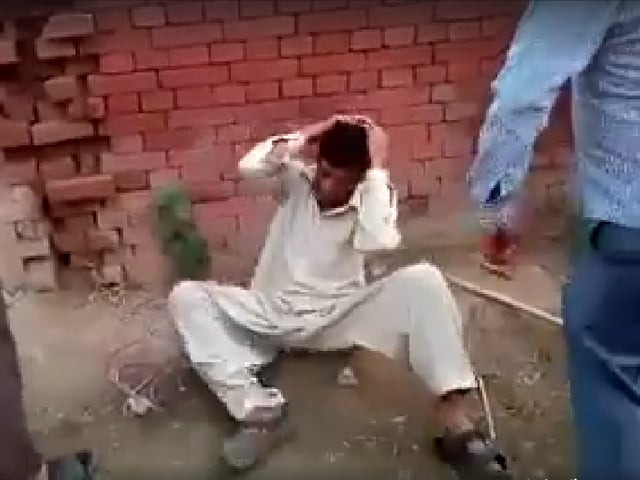Why was this Christian boy beaten for drinking water from a mosque?
Many employers prefer Christians for sanitation jobs, and advertise for those jobs as open only to non-Muslims.

News and images of Pakistani Christians being beaten up or being wrongly prosecuted are not surprising for the Pakistani public, especially since Pakistan ranks number six on the Open Doors World Watch List for Christian prosecution. Verily, one cannot turn a blind eye to such violence when it takes place so often.
With the growing intolerance rate in Pakistan, many members belonging to minority groups continue to pay the price for acts they don’t even know constitute as crimes. And, realistically, they aren’t.
A couple of days ago, a Christian boy was shown to be brutally beaten up in a video for allegedly drinking water from a fountain located inside a mosque. Are these the consequences of him accessing a public facility which provides the most basic utility for survival? Is being physically assaulted in public by self-proclaimed Muslim men who took it upon themselves to punish an innocent person for stepping into a Muslim place of worship and sharing their water justified?
The video shows the boy yelling and screaming from pain after being whipped with wooden sticks and being beaten with shoes.
Evidently, in the Christian context, the root causes of the anxieties of the community owe it to the actions of common Pakistanis. However, there are many other non-violent forms of discrimination Christians have to tolerate on a daily basis, such as poor or no access to education, lack of employment opportunities, and hurdles in social mobility. Many employers prefer Christians for sanitation jobs, and advertise for those jobs as open only to non-Muslims (read: Christians wanted). For instance, the derogatory term “churha” (sweepers) is commonly used to describe Christians.
In fact, it’s important to take into account the impacts of both class and religion in order to understand the discrimination the Christian community faces. Caste-based discrimination has existed in this part of the world for years, so to say that religious intolerance is the only factor contributing to their discrimination is very limiting.
These negative perceptions have created a dangerous situation for the peace and security of Pakistan’s Christian community. The suffering they face and how they are viewed by the mainstream Muslim population can be measured by the horrendous conditions with which they must compete on a daily basis. Forced marriage and conversion to Islam are some of the worst kinds of challenges they encounter.
The mistreatment of minorities is a stain on the wider Pakistani society. Even though terrorists are the most violent troublemakers, it is the public attitude that indicates minorities as targets for militants. Perhaps, Pakistan can be made a safer country by killing militants but ultimately this move will not really change the lives of those who have to live with dehumanising stereotypes every day. Until their fundamental rights are not widely recognised and granted, and such tensions are not resolved, Pakistan will continue to be at the frontline for violating, assaulting and prosecuting Christians.
This video shows one of the many violations that take place against the Christian community in Pakistan. However, other such countless incidents are not reported, filmed, nor made viral on social media platforms.
Therefore, as Pakistan persists to fight extremism, it needs to comprehend that military interventions are not enough.
In regards to the hoopla surrounding the authenticity of the said incident (video), the matter of fact is that the young boy was beaten up by a mob. Whether it was because he drank water from a mosque or stole a car battery, mob justice is not justice. Instead of questioning the reason behind his bruises, a little empathy towards our minorities could go a long way.
With the growing intolerance rate in Pakistan, many members belonging to minority groups continue to pay the price for acts they don’t even know constitute as crimes. And, realistically, they aren’t.
A couple of days ago, a Christian boy was shown to be brutally beaten up in a video for allegedly drinking water from a fountain located inside a mosque. Are these the consequences of him accessing a public facility which provides the most basic utility for survival? Is being physically assaulted in public by self-proclaimed Muslim men who took it upon themselves to punish an innocent person for stepping into a Muslim place of worship and sharing their water justified?
The video shows the boy yelling and screaming from pain after being whipped with wooden sticks and being beaten with shoes.
Evidently, in the Christian context, the root causes of the anxieties of the community owe it to the actions of common Pakistanis. However, there are many other non-violent forms of discrimination Christians have to tolerate on a daily basis, such as poor or no access to education, lack of employment opportunities, and hurdles in social mobility. Many employers prefer Christians for sanitation jobs, and advertise for those jobs as open only to non-Muslims (read: Christians wanted). For instance, the derogatory term “churha” (sweepers) is commonly used to describe Christians.
In fact, it’s important to take into account the impacts of both class and religion in order to understand the discrimination the Christian community faces. Caste-based discrimination has existed in this part of the world for years, so to say that religious intolerance is the only factor contributing to their discrimination is very limiting.
These negative perceptions have created a dangerous situation for the peace and security of Pakistan’s Christian community. The suffering they face and how they are viewed by the mainstream Muslim population can be measured by the horrendous conditions with which they must compete on a daily basis. Forced marriage and conversion to Islam are some of the worst kinds of challenges they encounter.
The mistreatment of minorities is a stain on the wider Pakistani society. Even though terrorists are the most violent troublemakers, it is the public attitude that indicates minorities as targets for militants. Perhaps, Pakistan can be made a safer country by killing militants but ultimately this move will not really change the lives of those who have to live with dehumanising stereotypes every day. Until their fundamental rights are not widely recognised and granted, and such tensions are not resolved, Pakistan will continue to be at the frontline for violating, assaulting and prosecuting Christians.
This video shows one of the many violations that take place against the Christian community in Pakistan. However, other such countless incidents are not reported, filmed, nor made viral on social media platforms.
Therefore, as Pakistan persists to fight extremism, it needs to comprehend that military interventions are not enough.
In regards to the hoopla surrounding the authenticity of the said incident (video), the matter of fact is that the young boy was beaten up by a mob. Whether it was because he drank water from a mosque or stole a car battery, mob justice is not justice. Instead of questioning the reason behind his bruises, a little empathy towards our minorities could go a long way.


COMMENTS
Comments are moderated and generally will be posted if they are on-topic and not abusive.
For more information, please see our Comments FAQ